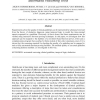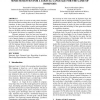855 search results - page 43 / 171 » Using First-Order Logic to Reason about Policies |
AMAI
2004
Springer
14 years 1 months ago
2004
Springer
The framework of algorithmic knowledge assumes that agents use algorithms to compute the facts they explicitly know. In many cases of interest, a logical theory, rather than a par...
CORR
2008
Springer
13 years 7 months ago
2008
Springer
Requirements about the quality of clinical guidelines can be represented by schemata borrowed from the theory of abductive diagnosis, using temporal logic to model the time-orient...
AIA
2006
13 years 9 months ago
2006
Epistemic logic allows to reason not only about situations, but also about the knowledge that a set of agents have about situations. In later years, epistemic logic has been appli...
POPL
2012
ACM
12 years 3 months ago
2012
ACM
Differential privacy is a notion of confidentiality that protects the privacy of individuals while allowing useful computations on their private data. Deriving differential priva...
LPAR
2010
Springer
13 years 5 months ago
2010
Springer
Abstract. A meta-program is a program that generates or manipulates another program; in homogeneous meta-programming, a program may generate new parts of, or manipulate, itself. Me...


